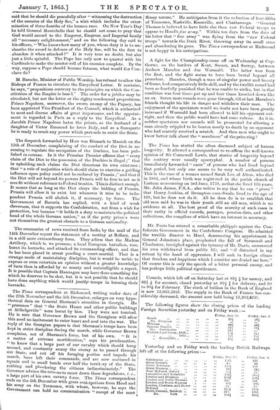The Times correspondent at Richmond, writing under date of the
27th November and the 5th December, enlarges on very hypo- thetical data on General Sherman's atrocities in Georgia. He " presumes" that " the State House and other public buildings at Milledgeville" were burnt by him. They were not touched. He is sure that Governor Brown and the Georgians will after this need no incitement to enter heart and soul into the war. The reply of the Georgian papers is that Sherman's troops have been kept in strict discipline during the march, while Governor Brown complains, not of Sherman's force, but of his own. " It is a matter of extreme mortification," says his proclamation, " to know that a large part of our cavalry which should hang around, and constantly annoy the enemy as he passed through our State, and cut off his foraging parties and impede his march, have left their commands, and are now scattered in squads and in small bands over half the territory of the State, robbing and plundering the citizens indiscriminately." The Governor advises the chins to shoot down these depredators, i. e., a large part of his own cavalry force. The Times correspondent ends on the 5th December with great anticipations from Hood and his army on the Tennessee, with whom, however, he says the Government can hold no communication " except of the most flimsy nature." He anticipates from it the reduction of four-fifths of Tennessee, Nashville, Knoxville, and Chattanooga. " General Thomas is believed to have little else than raw Federal troops to oppose to Hood's fine army." Within ten days from the date of his letter that " fine army" was flying from the "raw Federal troops" towards the Duck River, throwing away its small arms and abandoning its guns. The Times correspondent at Richmond is not happy in his anticipations.




































 Previous page
Previous page